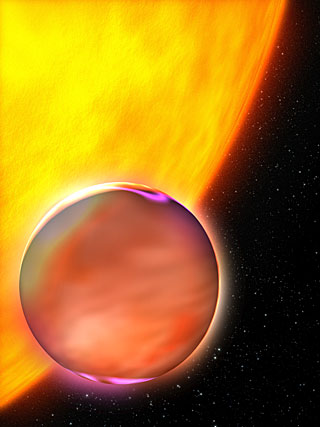Let me begin by saying that I think I am falling in love with planets. I don’t know how, but during the course of following the saga of exoplanets it must have been inevitable (after all, the ‘exoplanet’ bears the name of ‘planet’).
With new discoveries that pour in almost daily about planets in other star systems, Exoplanets are a constant source of amazement. They continue to remind me that I can never know enough, that this fascinating universe is an endless source of wonder.
But...something keeps getting in the way. Something mind-numbing creeps in when I read something about what a ‘planet’ is defined to be. It has bothered me so much that I had to use “worlds” as an alternative keyword to hook me back in wonder about these spherical objects in space.
Why? What happened with the term “planet”? What happened with the magical and mythical concept that the Greeks once started with, saying that these mysterious points of light are ‘wanderers’?
The problem began when mankind started to *define* the Planet. We relentlessly squished the concept of a planet with words so that it could fit within our tiny skulls.
I looked into the two sides of the debate, learning as much as I can to understand, but the mandated definition of the Planet really does not appeal to me. In the spirit of freethinking, I humbly decline to subscribe in the 'official' definition of the planet.
Why? What have humans done to the concept of the planet?
There is nothing inherently wrong with classifying things, and certainly nothing wrong with identifying the boundaries in order to characterize objects, but I think we had the wrong attitude when we made up the criteria for planets.
And that is the sad thing about it. Instead of trying to widen the concept of the Planet, we tried to limit it. The kind of thinking that is promoted by the current definition of the planet is a divisive mode of mentality. You see, in our world, much strife is borne out of a discriminating mindset--a way of thinking that focuses on the differences and not on the similarites.
"The major problems in the world are the result of the difference between how nature works and the way people think." ~Gregory Bateson
Today, dwarf planets are not considered planets at all, despite calling them 'dwarf planets'. Is it a matter of linguistic fallacy that makes it all nonsensical? (Dwarf galaxies are galaxies, and dwarf stars are stars, but dwarf planets are not planets?)
Or is it just the mode of thinking? Why deny dwarf planets of being planets? Such judgement mirrors a way of thinking that is alienating and divisive.
It is certainly valid if you consider dwarf planets as a subset or variation of the wide scope of planets. This alternative method of classification exemplifies a way of thinking that respects differences and yet aims to see things as One.
You can choose a mindset that seeks to see all kinds of planets in a wholistic fashion, and delight in their diversity. Or you could choose a discriminating mentality, segregating a class of planet-worlds that don’t fit in your limited notion based on one star system alone--yours.
The Pluto debate is a clash of mentalities. And it has marred the concept of the planet. I hope that the next generation never inherits the discriminating mentality that is present in that conflict.
I rest my case in the lessons that exoplanets are teaching us. They continue to challenge our pre-defined notions of what a planet truly is. They continue to be a source of wonder, in the same way that the Ancient Greeks felt about their ‘wanderers’. In our modern era, only the Exoplanet can conjure that feeling of mystery and discovery ascribed to such mysterious objects.
For me, Exoplanet is the new Planet.
I wish we never end up defining the Exoplanet in the same way we did for the Planet, for I wish to keep the concept of the Exoplanet with awesomeness and wonder.

